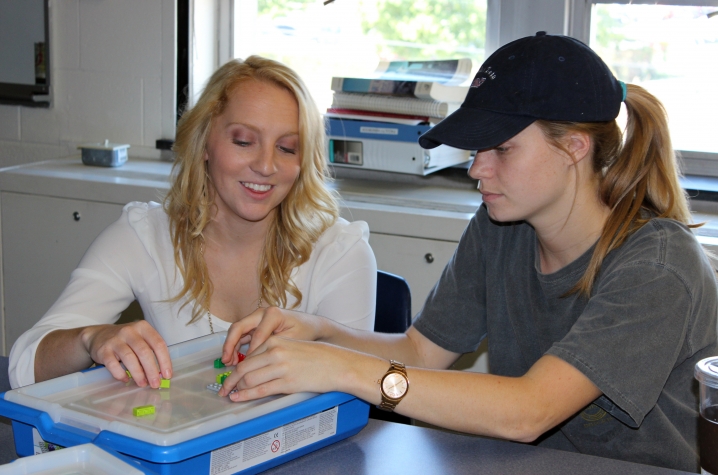Learning Through Play: College of Education Brings LEGO to Students, Kentucky Teachers
LEXINGTON, Ky. (Oct. 1, 2015) — A classroom full of college students tinkered with LEGO toys last Thursday, building ducks and snakes. But this wasn't play-time for University of Kentucky elementary education students. It was professional development.
In the one-day workshop led by LEGO Education trainers, a total of 98 UK College of Education students — who will be student teachers in the spring — learned how to use LEGO kits to teach hands-on language arts, science, math and engineering curricula in their own classrooms someday.
Fifty teachers in Fayette County and across Kentucky, from both private and public schools, also participated in a similar LEGO workshop co-hosted by the college, Fayette County Public Schools (FCPS) and LEGO on Friday at the Lexington Public Library. Representatives from the American Institute for the Blind also attended to explore how LEGO instruction might be adapted for the visually impaired. During the workshop for teachers, 10 school administrators visited classrooms and observed teachers using LEGOs in instruction.
"What is novel and important about this particular workshop is bringing together educators, working along the P-20 (primary through college) continuum — some just learning to teach, some many-year veterans — to leverage the expertise and perspectives we all bring to creative and engaging teaching and learning," said Joan Mazur, professor of instructional systems design in the Department of Curriculum and Instruction.
Mazur helped organize the workshops, along with Leanna Prater, a technology resource teacher for FCPS and doctoral candidate in instructional systems design at UK, and Regina Dawson, co-chair of the Elementary Education Program.
Students and teachers learned how to lead simple activities that had deep and engaging content connections. For example, a task for first graders required using 14 LEGO blocks to build a snake. A second round of building required they use the same blocks but in a different configuration, and a third round required they build another snake with different blocks.
"Very simple but complex ideas of division that first graders might not necessarily tackle on paper," Mazur said.
Following the student workshop, one UK student said their takeaway was that "everybody thinks differently, everyone solves problems in different ways." Another student said it proved to her the power of communicating and sharing ideas in an elementary classroom.
MEDIA CONTACT: Whitney Harder, 859-323-2396, whitney.harder@uky.edu






